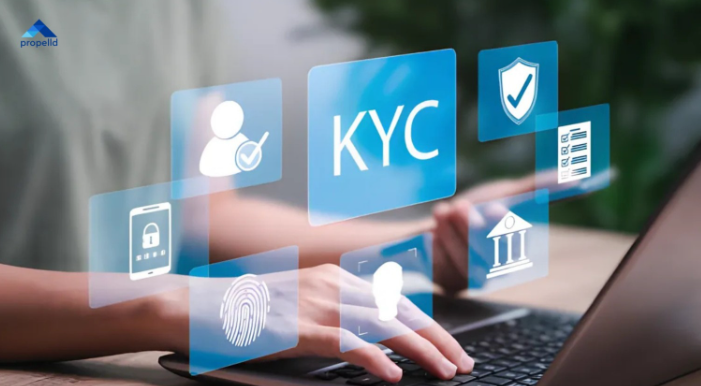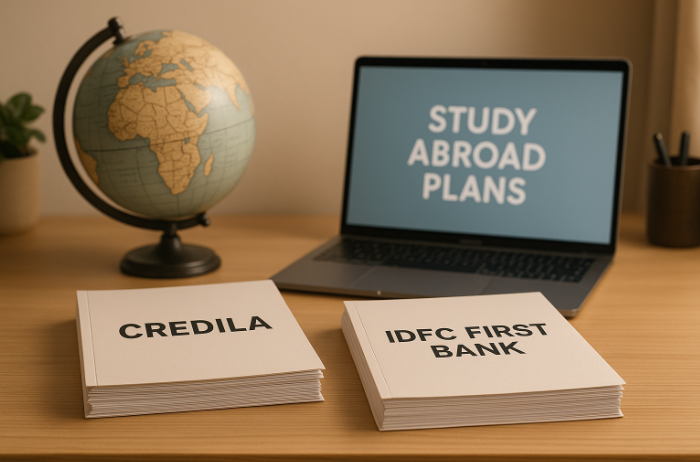Ever wondered why banks ask for your ID proof again and again? That’s part of a process called Know Your Customer (KYC). It’s a way for banks and financial institutions to make sure you are who you claim to be. With online fraud and scams on the rise, this step has become more important than ever. In 2024 alone, spending on KYC and Anti-Money Laundering services went up by almost 14.7%, crossing $2.5 billion.
In this article, we’ll explain what KYC means, how the process works, and why it matters. Keep reading to learn more.
What Does KYC Mean?
In simple terms, KYC is the method banks, financial institutions, and even fintech companies use to verify the identity of their customers. The goal is to ensure that the money being deposited or transferred comes from legitimate sources and to protect against fraud, money laundering, and other financial crimes.
The shift to digital banking is making KYC grow even faster. The global KYC software market was worth $1.48 billion in 2024 and is expected to touch $1.92 billion in 2025, with future projections going as high as $16 billion by 2033.
Importance of the KYC Process
The KYC process is a safeguard that helps protect both institutions and customers from risks. With the rise of online banking and digital payments, fraud and identity theft have also grown. According to the Reserve Bank of India (RBI), reported banking frauds in India touched ₹13,930 crore in FY 2024, highlighting why stricter identity checks are needed.
Here are the key reasons why the KYC process is so important:
1. Fraud Prevention
By verifying customer identity, banks can reduce cases of impersonation, fake accounts, and online scams.
2. Compliance with Laws
KYC is a legal requirement under anti-money laundering (AML) regulations worldwide. Institutions that fail to follow it face heavy penalties.
3. Financial Transparency
KYC makes sure that transactions are traceable, reducing the chances of black money being circulated.
4. Customer Trust
When banks follow a strong KYC process, customers feel more secure about their money and personal data.
5. Smooth Digital Transactions
With e-KYC and digital verification, the process has become faster and easier, encouraging more people to use online banking.
For a deeper understanding of how banks and NBFCs function within the regulatory framework, you can also check out our detailed guide on RBI Guidelines for Education Loans in India.
Get an Education Loan 10X Faster than Banks.
Know Your Customer Requirements
One of the most important parts of the KYC process is submitting the right documents. Banks and financial institutions rely on these papers to verify a customer’s identity, address, and financial profile. Without proper documents, KYC cannot be completed.
Here are the key KYC requirements for verification:
- Proof of Identity, including Passport, Aadhaar card, PAN card, voter ID, or driver’s license.
- Proof of Address: Utility bills (electricity, water, gas), rental agreement, passport, or Aadhaar card showing current address.
- A recent passport-sized photo is usually required for records.
- A PAN Card is mandatory in India for opening bank accounts, investing in securities, or making high-value transactions.
- Additional Documents for Businesses like Partnership deeds, company incorporation certificates, or GST registration for firms and corporates.
Education Loan - Min Docs. Max Approval. Min Hassle. Max Tenure.
Different Types of Know Your Customer (KYC)
The KYC process is not the same for everyone. Depending on the type of customer, the size of transactions, and the risk involved, banks and financial institutions follow different levels of verification. For example, the Reserve Bank of India (RBI) introduced Video KYC and simplified digital verification methods to make the process faster and more convenient.
Here are the main types of KYC you should know:
1. Simplified KYC
Simplified KYC service is for people who may not have complete documents but still need access to basic financial services. It is mainly used for small accounts, low-value transactions, or digital wallets where the risk of money laundering or fraud is low. Instead of requiring multiple ID proofs, simplified KYC often accepts just one government-issued ID, such as Aadhaar or voter ID, to get started.
2. Basic KYC
Basic KYC is the standard form of customer verification that most banks and financial institutions follow before opening an account. Basic KYC requires customers to provide valid proof of identity and proof of address, such as an Aadhaar card, passport, voter ID, or driving license.
In India, RBI regulations make basic KYC mandatory for all savings and current accounts, fixed deposits, mutual funds, and insurance policies.
3. Enhanced KYC
Enhanced KYC is a more detailed verification process carried out for customers who may pose higher financial risks, such as businesses with large transactions, politically exposed persons (PEPs), or individuals dealing in foreign currency. Enhanced KYC digs deeper into the customer’s background, source of funds, and nature of transactions.
For example, banks may ask for income proofs, tax returns, business ownership documents, or additional address verification to complete this process. They may also conduct face-to-face verification for added security.
4. Video KYC
Video KYC is a modern method of completing customer verification remotely through a live video call. Instead of visiting a bank branch or submitting physical documents, customers can show their ID proof, address proof, and even complete face verification over a secure video platform.
5. Corporate KYC
Corporate KYC is carried out to verify the identity and authenticity of companies, partnerships, trusts, or other business entities. Unlike individual KYC, it requires more extensive documentation to ensure that the business is genuine and compliant with AML and CFT (Countering Financing of Terrorism) norms.
Typically, institutions ask for the Certificate of Incorporation, Memorandum and Articles of Association (MOA & AOA), PAN card of the company, address proof of the registered office, and KYC details of directors, beneficial owners, and authorised signatories.
6. Periodic KYC
Periodic KYC is the process by which banks and financial institutions re-verify a customer’s identity and documents at regular intervals. This ensures that customer information stays accurate and up to date, especially if there are changes in address, income status, or business activity. For individuals, documents like updated Aadhaar, PAN, passport, voter ID, or utility bills may be requested. For companies, banks may again ask for the latest incorporation details, board resolutions, and director KYC.
What is e-KYC?
The e-KYC, or electronic Know Your Customer, is the digital version of the traditional KYC process. Customers can verify their identity online using Aadhaar-based authentication or other government-approved digital methods.
According to a report posted by PIB, e-KYC transactions recorded a nearly 40% jump in April 2025, reflecting its growing role in improving customer convenience and streamlining business operations across multiple sectors.
Key benefits of e-KYC include:
1.Instant verification
Customers can authenticate their identity in minutes using Aadhaar OTP or biometric validation.
2. Paperless process
No need to submit hard copies of PAN, Aadhaar, or address proof.
3. Cost efficiency
Aadhaar-enabled e-KYC has reduced operational costs for banks and fintechs. Lower costs also mean financial institutions can pass on the benefits to customers by offering faster services, lower fees, and quicker approvals.
4. Wider access
Helps rural and semi-urban users open accounts easily, bridging financial gaps.
Anti-Money Laundering (AML) and Know Your Customer (KYC)
Preventing fraud and ensuring transparency have become top priorities for banks, NBFCs, and other financial institutions. While KYC focuses on verifying the identity of customers, AML goes a step further by monitoring financial activities to detect and prevent illegal transactions. Together, they form the backbone of financial compliance, protecting both institutions and customers.
KYC verifies who you are, while AML checks what you do with your money. Both are equally important for building a safer and more transparent financial ecosystem.
KYC in the Cryptocurrency Space
Cryptocurrencies have opened up new opportunities for digital payments and investments, but they have also raised concerns about fraud, scams, and untraceable transactions. Since crypto operates on decentralised networks, regulators across the world have made Know Your Customer (KYC) a mandatory step for exchanges and platforms.
This ensures that digital assets are not misused for money laundering, terror financing, or illegal trading.
Know Your Customer Process in India
With the increasing push for digital banking, both offline and e-KYC options are now available, making the process faster and more user-friendly. Here’s a step-by-step look at how the KYC process works in India:
1. Collection of Information
The first step in the KYC process is gathering a customer’s basic details such as full name, date of birth, contact number, and residential address. Banks and financial institutions use this information to create a customer profile and match it with official records for verification.
2. Document Submission
Commonly accepted documents include Aadhaar card, PAN card, voter ID, passport, or driving license for identity, and utility bills, bank statements, or rent agreements for address verification. Financial institutions often allow both physical and digital submissions, making the process faster and more convenient.
3. In-Person Verification or Video KYC
After document submission, the next step is verifying the customer’s identity. With digital adoption, Video KYC has become the preferred method. In this process, a live video call is conducted with a bank official who verifies the documents, cross-checks the customer’s face with their ID, and asks a few basic questions for confirmation.
4. Approval and Activation
At this stage, the submitted documents and verification results are reviewed by the bank or financial institution’s compliance team. If everything matches the regulatory requirements, the customer’s profile is approved, and the account or service is activated.
Key Elements of KYC Compliance in India
KYC compliance refers to the process of verifying the identity, address, and financial background of individuals or entities before granting access to financial products and services. Here are the major components of KYC compliance:
1. Identity Verification
This step ensures that the customer is who they claim to be. It includes checking government-issued documents, validating biometric details such as fingerprints or facial recognition, confirming residential address, and using digital methods like Aadhaar-based verification for faster processing.
2. Customer Due Diligence (CDD)
Here, financial institutions evaluate the customer’s financial background and risk level. This involves assessing the nature of their business relationship, verifying the origin of funds, profiling customers based on potential risk exposure, conducting enhanced due diligence (EDD) for high-risk cases, and carrying out background checks to rule out links to fraud or money laundering.
3. Ongoing Monitoring
KYC does not end once the account is activated. Constant monitoring is equally vital. Institutions track transactions for unusual activities, recognise irregular patterns, update customer profiles regularly, and rely on automated alert systems integrated with compliance tools. This proactive approach helps identify risks early and ensures adherence to anti-money laundering regulations.
How Often Do You Need to Update Your KYC? Learn What Students Are Discussing!
KYC needs to be updated periodically to keep your account active. Many financial platforms have strict compliance rules, and failing to refresh your KYC on time may even result in your account being blocked.
A Reddit user shared:
"I didn’t update my KYC on time, and Revolut closed my account. Even after completing KYC later, they wouldn’t reopen it. Do I have to do it manually, on my own, or will I receive a notification when it's time for a new KYC?”
Insight: Most financial institutions notify users when their KYC is due, but the responsibility still lies with you to complete it promptly. Ignoring the update window can cause permanent account closure in some cases.
What do we infer from the above case?
KYC updates are crucial and non-negotiable. Financial platforms rely on periodic KYC refreshes to meet regulations and prevent misuse.
Tip: Always keep your documents updated and enable notifications on your banking or fintech app so you don’t miss reminders for KYC renewal.
Steps to Complete the KYC Form in India
Filling out the Know Your Customer form is a mandatory process for anyone opening a bank account, investing in mutual funds, applying for loans, or accessing other financial services in India.
Below is a simplified process to ensure you fill out the form correctly.
1. Obtain the KYC Form
You can get the KYC form either from your bank, financial institution, or directly from the KYC Registration Agency (KRA) website. Many providers also allow online KYC (e-KYC) submission, making the process faster.
2. Fill in Personal Information
Provide accurate details such as your full name, date of birth, contact number, email ID, and residential address. Ensure these match your government ID documents to avoid discrepancies.
3. Submit Proof of Identity and Address
Attach self-attested copies of acceptable documents like Aadhaar, PAN card, Passport, Voter ID, or Driving License.
4. Provide Financial Information (if required)
In some cases, especially for investments, you may need to share additional details like income range, occupation, or tax identification numbers.
5. Complete In-Person or Video Verification
Depending on the institution, you might be asked to visit a branch for in-person verification or complete a video KYC session.
6. Submit and Track Application
Once submitted, your KYC request is processed by the institution or KRA. You can track the status online through the KRA portal or by contacting your financial service provider.
Know Your Customer (KYC) today is what keeps banking safe, simple, and trustworthy. With faster options like Aadhaar-based e-KYC and video verification, opening an account or accessing services has never been easier. For customers, it means less paperwork and quicker approvals, while for banks, it builds a secure system that stops fraud before it starts. In many ways, KYC is the trust bridge between people and the financial system.
Secure your future without worrying about financial roadblocks. Propelld makes education financing simple with 100% digital loan approvals, zero hidden charges, and flexible repayment plans tailored to students. Propelld supports your journey with loans up to ₹50 lakhs.
Take the stress out of funding your studies Apply with Propelld today and focus only on chasing your dreams!











.svg)